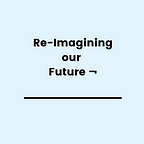Re-Imagining our Relationship to Water
“The future depends on what you do today.” — Gandhi
Historically, civilizations grew around rivers in their valleys (i.e. Nile and Indus valleys). It is relatively very recent in human history that we now dwell and thrive in spaces that are far away from river bodies. I (Deepak) have read earlier that the city of Mumbai, with its population of 20 million people, draws its water requirement from large reservoirs and rivers that are more than a 100 kms away from downtown city. Ironically, the native population living around these reservoirs have been restricted access to these bodies of water that are present in their communities.
Increasingly, these rivers are becoming polluted. A lot of industries, which stem out of urban areas, and are operated by our fellow citizens, release untreated or under-treated waste into these waters. In addition, the local people often discard ritualistic offerings or domestic refuse into these rivers. Our rivers, which have been sources, and symbols, of life for thousands of years, are now being destroyed. They are becoming another innocent bystander of modernity.
My reimagination is that the general population (in India and elsewhere!) get sensitized to the fact that water is life. An ancient belief system regarded the river as a mother, alluding to its life-giving and life-sustaining capabilities. With this reality in mind, we are killing our mother! What if we start caring and nurturing for our rivers? What would it require to conserve and restore rivers? Strengthening the solid waste management setup around us can further reduce the negative impact on aquatic life. I envision that active community engagement models like Jal Biradari (translates to Water-Commune) will flourish glocally as we earnestly restore our relationship to rivers.
Growing up in a small city in Upstate New York, I (Dan) did not have much of a relationship with water bodies during my childhood. We have a water reservoir in our city, as well as a marsh, both of which I know very little about. The water reservoir is fenced off. Considering how important water is to my daily life, it perplexes me how I know so little about where it is sourced and what it is treated with! My guess would be that I am not alone in being uninformed and disconnected to the source of water?
While living in the desert, in rural India, water was precious. Most of the local residents, in the community I lived in, still fetched their water from handpumps that connected to bore wells. Every drop was cherished. As the people from the cities came into this village, so did indoor running water, increased air conditioners and technological innovation. The water table could not sustain the increased demands, and soon water shortages came, and water had to be trucked in from neighboring villages.
Water is in most everything we do. The cotton to grow our clothes is dependent on water. The wood for our houses, machines to make our technology. Water is one of the key ingredients for growing our vegetables, and the crops that feed the animals that we consume (Water Footprint of Food). And, with increased consumption, Water scarcity is becoming increasingly widespread around the world.
Humility is a trait that is found in most all spiritual traditions. A simple definition is “limiting oneself to an appropriate amount of space while leaving room for others” [1] With water in mind, are we, humans, acting with humility? Perhaps this question is more pertinent to those of us in urbanized, highly technological, localities?
What if we were to bring increased humility into our relationship with water? What if we were to consume less, so others, across space and in coming generations, could simply have the chance to greet the source of life, and ultimately to live?
“Earth provides enough to satisfy every man’s needs, but not every man’s greed.” — Gandhi
Lead Author: Deepak
Recently, Deepak bought an inflatable kayak and started to paddle in river waters, with the intention of exploring and getting to know the rivers better. After feeling the power of the river, he decided to invite others to join in the exploration, and has since hosted over a hundred citizens from around Mumbai in the Ulhas river and its tributaries that feed into it. They have observed that water quality ranges from extremely stinking polluted water canals to barely swimmable waters.
Besides hosting kayak sessions on Ulhas river, he is building indoor swim pool infrastructure for aqua-therapy and aqua-fitness purposes (www.FitPools.net). He currently lives in a suburb of Mumbai, and has earlier lived in Calicut, Kerala and in Bangalore.
Related links:
[1] LinkedIn profile: https://www.linkedin.com/in/malanideepak
[2] Personal blog: https://malanideepak.wordpress.com/kayaking/
[3] Email: malani.deepak7@gmail.com
[4] Photos from kayaking sessions: https://photos.app.goo.gl/k7C9N6PbPpM5iKS36
[5] Photo-essay published by Citizen Matters, an independent news media outlet with a focus on cities and citizens by reporting on critical issues, ideas and solutions to India’s urban issues. https://mumbai.citizenmatters.in/kayaking-on-the-ulhas-river-21889
[6] Photo-documentation of animal-life around Bhatsa river, as clicked by a fellow kayaker, Pradip Patade, co-founder of Marine Life of Mumbai.
https://docs.google.com/presentation/d/1Oz0vCYx2sLXMdK6tJ1qlYEfuYHplcEhQGUGF24z3amw/edit?usp=sharing
Anchor Author: Daniel Rudolph
Daniel Rudolph is interested in exploring alternative, experiential learning opportunities for people of all ages. He is passionate about forming community, and building public spaces for meaningful, transformational gathering. Currently he is spending a lot of his time learning juggling and facilitating gatherings. He also enjoys writing and sharing poetry.
Dan, and a small team, are in the process of publishing a series of articles titled ‘Live Human Signposts’ that showcases individuals that have taken alternative paths to higher education and/or are pursuing regenerative livelihoods, which is being commissioned by the Ecoversities Alliance. In March, Dan will begin an apprenticeship in Vermont at the MAPLE Monastic Academy.
